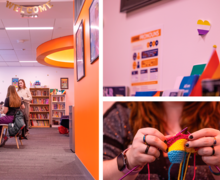AIDS event fosters dialogue, campus awareness
A member of Pastor Bernard Alex’s congregation called him a few years ago and asked that he come to the hospital, where a boy was dying of AIDS. When the boy’s mother called her own church, the pastor there said, ‘Good for him, it’s God’s will that he die,’ and refused to come to the boy’s side. Alex went instead and later vowed that he will never allow people to be uneducated about HIV/AIDS.
‘How many of you are proud to say you know your HIV status?’ said Alex, as some audience members began to raise their hands. ‘If you don’t know, you need to know.’
Students, faculty and Syracuse community members met on Saturday in Kittredge Auditorium in Huntington Beard Crouse Hall for ‘You Better Act Like You Know,’ an event to help spread HIV/AIDS awareness, sponsored by the Delta Sigma Theta Sorority. The event was held as part of National Black HIV/AIDS Awareness Day, which was on Feb. 7.
To commemorate the day, Syracuse University’s Black Celestial Choral Ensemble sang ‘The Blood,’ a gospel song. The event also included dance and poetry performances by D.O.V.E.S, liturgical dancers and a spoken word performance.
The event was interspersed with group discussions where panelists from the FACES program, an HIV/AIDS awareness program of the Syracuse Southwest Community Center, answered audience questions about everything from how HIV is contracted to why the black community has higher incidences of the disease.
One subject that many questions focused on was whether or not HIV had a dormant state, in which the disease cannot be transmitted. Audience members learned that this is not the case. There is no dormant state of HIV.
Teresita Mann, one of the FACES panelists, said she was surprised at how many questions the audience had and how interested everyone was in the subject. She said it is important for everyone to learn this information so they can protect themselves.
‘The most important thing I hope comes out of this event is that people are able to help and teach others what they learned today,’ said Mann. ‘Everyone needs to know.’
After the event, FACES and student group, Sex SYMBOLS, sexually conscious, youthful, mature, black and Latino students, had tables with information for audience members.
These booths included condoms with information about sexually transmitted diseases on the wrappers and various statistical charts showing the numbers of STDs in each part of the country. About 150 people attended the event and Timeka Williams, President of Sex SYMBOLS, said everyone was very interested in the information.
‘While the questions asked today show the true need for events like this, many questions were asked, but many more went un-answered,’ said Williams. ‘I wish more SU students would have come today, and I hope there can be more events like this.’
Published on February 8, 2009 at 12:00 pm





